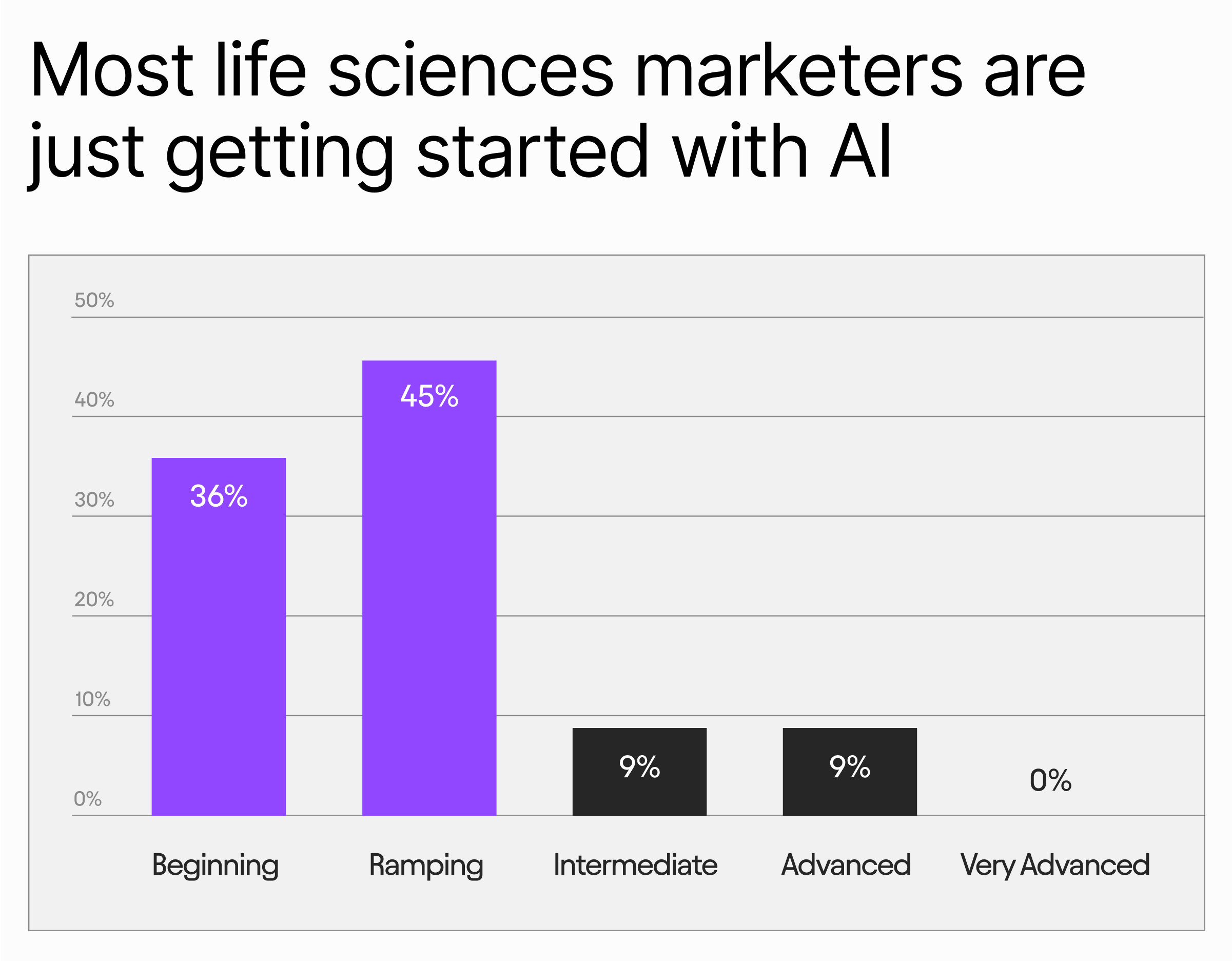The State of AI in Life Sciences Marketing 2025
Learn where life sciences marketing measures up in AI adoption and how domain-specific tools can help teams drive results.

AI is reshaping marketing across industries, offering faster production, smarter personalization, and stronger strategic insights. But in highly-regulated sectors like life sciences, adoption looks different. Here, marketers are cautious—balancing enthusiasm for AI’s potential with concerns about compliance, accuracy, and trust.
Jasper’s 2025 State of AI in Marketing Report highlights this unique dynamic. Life sciences marketing teams—including those in pharma, medtech, and related sub-verticals—report the lowest AI maturity across all industries. Only 17% believe AI will significantly impact their roles. Formal AI programs are rare, and leadership commitment remains a major gap.
Yet when life sciences teams do use AI, they find real value; 45% say it has improved their job satisfaction, suggesting that the opportunity is there—if confidence can be built.
Let’s look deeper to discover why life sciences marketers are hesitant, where AI is already making an impact, and what it will take for the industry to close the confidence gap and unlock the full value of AI.
Want deeper insights into the future of AI in marketing? Download Jasper’s State of AI in Marketing Report.
Low leadership support and unclear programs are slowing progress
Despite growing interest in AI, life sciences marketing teams are being held back by a lack of organizational support and clear guidance. Leadership commitment is a significant weak point—only 17% of life sciences leaders report they’re “very committed” to AI adoption, and an alarming 0% of marketers in the industry feel satisfied with that leadership support.

The absence of formal training is another barrier—zero respondents reported having advanced AI training, meaning teams are underprepared to use new tools responsibly and effectively. At the same time, 39% of marketers in the sector say they’re unsure how AI will impact their roles. Structurally, only 22% of life sciences companies report having a formal AI program in place.
In all of these areas, life sciences ranked lowest among all industries Jasper surveyed. Without structured programs and leadership direction, marketing teams are left to navigate AI adoption alone, further fueling hesitation and slowing momentum.
AI maturity remains low, with 81% still in early stages
The lack of leadership support and formal AI programs has put the life sciences industry behind the AI curve. AI maturity in life sciences organizations remains significantly behind other industries, with 91% of life sciences marketers allocating 10% or less of their marketing budgets to AI initiatives.
More than 80% of life sciences teams are in the early stages of adoption—36% are beginning, 45% are ramping, and only 18% have reached intermediate or advanced maturity.

Meaningful progress needs to happen sooner rather than later. Without stronger investment and operational integration, life sciences marketing teams risk missing the opportunity to leverage AI in ways that benefit key stakeholders and limit their ability to deliver the best possible results.
AI delivers clear value for life sciences marketers, but full transformation still lags
Despite structural barriers, life sciences marketers who have already adopted AI see its benefits, suggesting the opportunity is not just theoretical. Forty-five percent of life sciences marketers report that AI has improved their job satisfaction, and 39% say they plan to increase their use of AI tools in 2025. Many leaders also intend to increase AI budgets accordingly.
.png)
But today, life sciences organizations still primarily use AI in safe, task-oriented spaces like idea generation, content creation, SEO strategy, and research support. While these use cases help ease production bottlenecks and free up strategic capacity, the real opportunity for AI impact is in moving from tactical support to deeper operational transformation.
Building AI trust in life sciences
In life sciences marketing, technology must meet a higher standard. Scientific accuracy, regulatory compliance, and brand integrity are not optional—they are foundational. Teams need AI that strengthens these standards, not technology that forces uncomfortable compromises.
Building AI trust in life sciences starts with technology that:
- Follows complex instructions and match the precise tone required for scientific communications.
- Has built-in governance to align with strict review and regulatory approval processes.
- Integrates seamlessly into established workflows to maintain compliance
- Delivers role-specific outputs tailored for medical, regulatory, brand, and regional marketing teams.
- Provides full auditability and transparency so teams know how content is created, reviewed, and approved.
Our research proves life sciences teams don’t lack interest in AI—but traditional AI tools haven’t proven they can meet the bar for trust, compliance, and operational rigor. Closing the confidence gap requires solutions designed for the complex realities of scientific marketing.
Marketing-specific AI offers new possibilities
Life sciences marketing teams operate in one of the most highly regulated environments in the business world, where scientific accuracy, compliance, and brand integrity are imperative.
In this landscape, generic marketing AI tools fall short. They can’t account for the nuance, rigor, or oversight the industry demands. Organizations need marketing-specific AI solutions that are purpose-built to align with their scientific standards and complex approval chains.
Embedded, domain-specific AI supports the level of brand governance, regulatory alignment, and operational scalability life sciences marketers need in a sector where the stakes are high and precision is non-negotiable.
According to Jasper’s research, companies using domain-specific AI are 37% more likely to measure ROI, demonstrating that marketing-specific tools drive more measurable outcomes than general-purpose platforms.
When AI is built with these standards in mind, it empowers marketers to deliver faster, more compliant, and more impactful campaigns that move the needle.